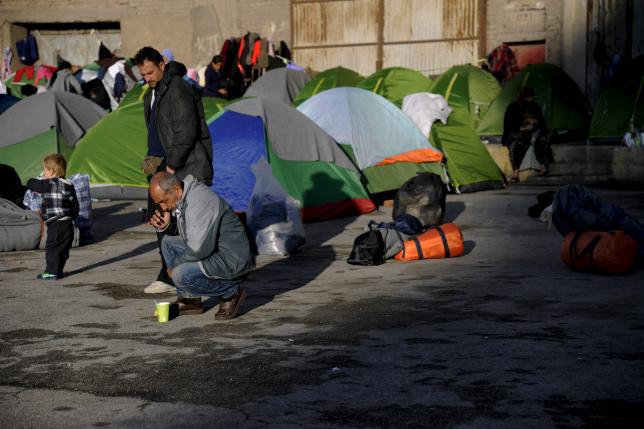
Refugees and migrants are seen by their tents, next to an old building at the port of Piraeus, near Athens, Greece, March 10, 2016. REUTERS/Michalis Karagiannis
Europe’s refugee crisis is posing great challenges for the Greek economy and the debt-laden country needs sizable help to cope with the migratory pours, the Organization for Economic Cooperation and Development said on Thursday.
While Greece is struggling to meet the terms of its international bailout which helps it stay afloat, it represents the main gateway into the EU for hundreds of thousands of refugees, mainly from Syria and other war-torn countries.
“The refugee crisis creates significant problems for the Greek economy and growth,” OECD Secretary-General Angel Gurria told reporters after meeting Prime Minister Alexis Tsipras in Athens.
“Greece needs to receive substantial support to deal with this new challenge. No single country can address this challenge on its own,” he said in comments translated into Greek.
His statements came days after European Union leaders froze a deal with Turkey on the migration crisis, saying details remained to be worked out, with a view to reaching an ambitious package agreement at a scheduled summit on March 17-18.
Gurria projected Greece’s economy would not expand this year but grow 1.9 to 2 percent in 2017. He warned that only through reforms the country could exit the debt crisis.
Although Tsipras said last week that he did not want to link the migration crisis with negotiations on bailout targets and debt relief, he still cautioned that Europe’s migrant crisis could affect countries financially.
More than 41,000 refugees and migrants are stranded in Greece, their plans to travel further north blocked by border shutdowns throughout the Balkans.
The European Union launched a new aid program last week worth an initial 700 million euros that mirrors the kind of disaster relief it offers developing nations.
Greece has asked for emergency funding and supplies including tents, blankets, sleeping bags and ambulances, from Europe to deal with the unprecedented crisis.
Greece and its international lenders resumed talks on Wednesday on its fiscal and reform progress, rekindling hopes that its first bailout review may be concluded next month.
Tsipras said on Thursday that Greece will seek a break in bailout debt repayments as part of negotiations with creditors expected in the spring.
A debt relief deal that Athens was “very close” to concluding, he said, would allow Greece to emerge from years of recession and near-zero growth, restore its credibility and lift capital restrictions imposed in June to end a flight of deposits amid political uncertainty.
“This would lead to a positive chain reaction, which will help us return to growth in the third quarter of 2016, right after June and lift capital controls,” he said.
